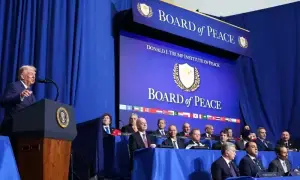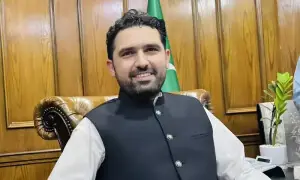What is the issue with Electronic Voting Machines?
4 min readThe Pakistan Tehreek-e-Insaf-led federal government decided to pass two major bills, including the use of Electronic Voting Machines (EVMs) for the next elections in 2023, in the joint session of the Parliament but the session was withdrawn on Wednesday.
Prime Minister Imran Khan and ministers have been touting the EVMs as modern and sceintific way to ensure free and fair polls.
However, the opposition parties along with the Election Commisison of Pakistan, are not in favor of EVMs.
Are EVMs a solution to Pakistan's elections which are always marred by controversies of rigging?
In September, the ECP raised 37 objections over the use of EVMs in elections. According to the commission, the machines are tempering-prone and its software could easily be altered, while they can’t stop rigging in elections.
The ECP said the time frame to implement the EVMs was too short -- from large-scale procurement and deployment of the machines to imparting training to a massive number of operators. The commission added that it was not advisable to introduce EVMs nationwide in one go.
Talking about the EVMs, Atif Majeed, a digital product development specialist, wrote an article in The Friday Times in which he discussed the challenges of rolling out EVMs for the next election.
Majeed, who was part of the team who first produced EVMs in Pakistan in 2011, wrote that a nationwide EVM-based election would require an estimated 85,000 voter identification machines, 170,000 control units, 340,000 ballot units, and 340,000 printer ballot boxes. In effect, we are talking about one million machines as opposed to 350,000 which need producing 3,000 units of machine per day, he wrote.
Majeed presented multiple solutions to produce EVMs, including outsourcing the production to some other country but that would lead to inviting other countries to accomplish their nefarious agendas through manipulation in election process by softwares in the machines.
The specialist said the government needed Rs75 billion only for developing machines, while other costs included packaging, transportation and installation, voter education, training of polling staff, election day tech-support in 130 districts across the country.
In case of any fault in the machine, it needs to be rectified by an expert. If the fault remains unsolved, the machines will have to be packed properly for the safety of voted polled in it and it will have to be replaced by another machine, wrote Majeed.
Majeed also noted that the government would need to bear expenses to store the machines after the elections for re-use in by-polls or next elections. They would need to bear costs to ensure the EVMs' safety and security of the machines.
In its session in September, the Senate Standing Committee on Parliamentary Affairs, along with civil society members, discussed the document submitted to them by the ECP on the issue.
ECP had raised 37 objections to the proposoal of EVMs in the next elections.
They included issues related to the election itself like low voter turnout, low women’s turnout, misuse of state authority, election fraud, ballot stuffing, vote buying, dishonest polling staff, misuse of state resources. None of these issues will be addressed by introducing EVMs, the commission maintained.
The commission also identified various issues in the EVMs, including lack of ballot secrecy, lack of capacity at all levels and lack of ensuring security and chain of custody for the machines at rest and during transportation.
In its briefing to the Senate standing committee, Minister of Science and Technology Shibli Faraz failed to satisfy the panel over vote casting on fake identities in EVMs.
Talking about the objections raised by the ECP on the machines, Shibli said the commission raised 27 objections due to its lack of capacity, while other 10 would be addressed.
Where are EVMs used?
Geo journalist Benazir Shah also quoted Majeed in her article saying out of 195 countries in the world, 167 are self-described democracies. Only eight countries use electronic voting process in elections, while nine countries have abandoned the idea of EVMs.
Majeed discussed this in his piece for The Friday Times writing how Ireland gave up on EVMs due to storage costs, logistics and corresponding security concerns. Talking about the costs in 2007, the expert said annual storage costs for 7,500 machines swelled up to €140,000 (About Rs3,500 per EVM, per year – or Rs3.5 billion per annum for 1 million units). Ireland took a decision to scrat the EVMs in April 2009 because it would cost too much to maintain them and were termed “a scandalous waste of public money.”
Pakistan did not have positive experiences of using technology in polls in the past. In 2018, the ECP experimented with a technology result transmission system (RTS) which led to delay in general election results held on July 25 across the country.
The then ECP Secretary Babar Yaqoob Fateh Mohammad blamed the RTS for the delay, saying the system had collapsed. He said the ECP then returned to its manual process of tabulating the results which caused delay in the release of official results.
For the latest news, follow us on Twitter @Aaj_Urdu. We are also on Facebook, Instagram and YouTube.
























Comments are closed on this story.